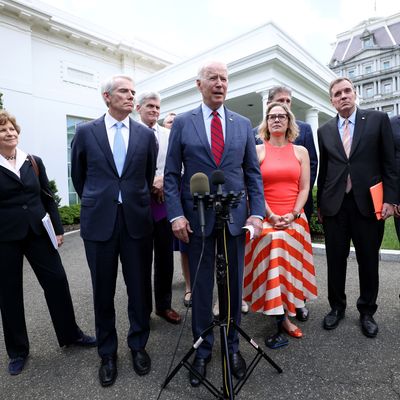
Thursday afternoon at the White House was a beautiful moment of golden nostalgia. Republicans and Democrats who negotiated a bipartisan infrastructure deal stood side by side, basking in mutual respect. “This reminds me of the days when we used to get an awful lot done up in the United States Congress,” President Biden said. “What we’re showing and demonstrating through this big breakthrough is that bipartisanship is possible,” exulted Senator Kyrsten Sinema. “We can achieve good outcomes that actually meet the needs of our country.”
Well, maybe. But in the cold light of morning, it seems more likely that the deal will ultimately fail, because bipartisanship, for the most part, isn’t possible. (I should note that I think the bill funds some important priorities, and I hope it passes, but I have difficulty believing it actually will.)
Within hours of the White House press conference, conservatives began registering bitter opposition. The source of their anger is that Biden promised progressive Democrats he would pass another measure, increasing social spending and raising taxes on the rich, along with the infrastructure deal.
“That’s extortion! I’m not going to do that,” cried Lindsey Graham. “The Dems are being told you can’t get your bipartisan work product passed unless you sign on to what the left wants, and I’m not playing that game.” Mitch McConnell immediately began pouring cold water on the deal, and the conservative media expressed unremitting opposition.
Why would McConnell and most of the party have sat back largely in silence while allowing members of their caucus to negotiate a popular deal, only for them to denounce it afterward? The reason many of them tolerated the bill in the first place is that they believed it would reduce the odds of Congress passing a second bill. “Some Republicans,” explains the Wall Street Journal editorial page, “hope the bipartisan deal will make it harder to pass a reconciliation bill by taking away the popular infrastructure bits.” (The Journal’s editorial page tends to closely echo McConnell’s beliefs, and has come out hard against the deal.)
That tactic made perfect logical sense for them. McConnell has strong policy preferences on taxing the rich — he would never accept even a single penny more on the tax bill of the richest person in the country — and weak policy preferences on infrastructure, which he can take or leave. A strategy of letting Democratic moderates sate their need for spending on an infrastructure bill that isn’t financed by taxing the rich, in the hopes that they would no longer feel the need to support Democratic social spending financed by tax hikes, was a shrewd play.
Democrats have blown up that strategy by sequencing the 50-vote Democratic social spending bill before the bipartisan infrastructure bill. Now infrastructure has to stand on its own, and can’t be used as a wedge to pry Manchin and Sinema away from their colleagues. Sure enough, Republican Senator Jerry Moran, formerly a supporter of the bill, now says he won’t back it unless Manchin and Sinema give assurances they won’t support a separate bill – a result Moran was obviously hoping would occur as a result of the bipartisan deal, but clearly was not part of the original negotiation.
The Republican public argument is that tying the two bills together represents a betrayal. The position that the parties can work together only if the majority party refuses to pass partisan bills is not one Republicans supported when they held majorities. Nor, for that matter, did Democrats ever make such a demand when they were in the minority. During Donald Trump’s first two years, Republicans worked on partisan legislation to cut taxes for the wealthy and repeal Obamacare, while Democrats negotiated (unsuccessful) deals on immigration reform, and then successful bills to provide COVID relief.
The Democratic Party view was that bipartisan dealmaking could operate on a separate track from partisan legislation. The parties would fight on issues they disagree on, and cooperate where they agreed. McConnell has always treated Democratic partisan legislation as a kind of offense that compels total warfare in retaliation.
McConnell’s calculation may be cold, but it is probably not wrong. He has been admirably clear about his strategy in the past. “It was absolutely critical that everybody be together because if the proponents of the bill were able to say it was bipartisan, it tended to convey to the public that this is okay, they must have figured it out,” he told the New York Times in 2010. “We worked very hard to keep our fingerprints off of these proposals,” he told The Atlantic in 2011, “because we thought — correctly, I think — that the only way the American people would know that a great debate was going on was if the measures were not bipartisan. When you hang the ‘bipartisan’ tag on something, the perception is that differences have been worked out, and there’s a broad agreement that that’s the way forward.”
The rule is that public displays of bipartisanship help the incumbent president. The exception to this rule is private bipartisanship, which explains why McConnell has gone along with “Secret Congress” deals between the two parties, which work almost entirely behind the scenes and attract little media attention. A bipartisan Rose Garden ceremony was a price he would be willing to pay if it brought the benefit of slimming down or possibly killing off Biden’s social agenda.
But now that bipartisan ceremony is all cost, no benefit. His incentive is to kill it off. He doesn’t need to bring every Republican senator along with him, as long as he can hold defections below ten.
The fate of this bill seems to pit the can-do cooperative spirit of Washington proving the system still works against McConnell’s calculation that his incentive is to make it fail. I would bet on McConnell.
This column has been updated.






























